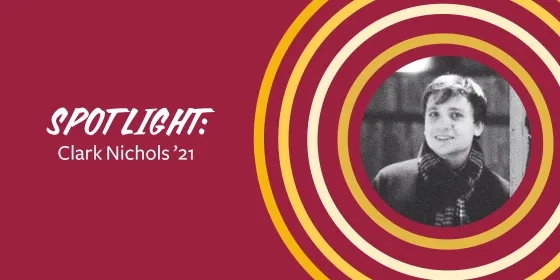Clark Nichols ’21 presents to American Musicological Society
The SFCM alum discusses their research and how SFCM has helped them grow musically.
In April, Clark Nichols (MM ’21) presented their paper entitled “The Legacy of Lou Harrison: Addressing Musical Cosmopolitanism, Epistemic Injustice, and Appropriation” to the American Musicological Society's Northern California Chapter. Nichols—who graduated from SFCM in May—wrote the paper after a lifelong fascination with Harrison—a composer known for incorporating elements of music from non-western cultures into his work—and diving into similar research in two Music History & Literature courses. Below Nichols shares more about their inspiration for the paper and how SFCM has shaped their career.
Can you give us a background on your research and a summary of the paper?
The paper was a response to some recent scholarship, particularly Bill Alves and Brett Campbell’s 2017 biography on Harrison. I really enjoyed the book, but there was a section of the book that I found rather baffling, in which the authors discussed the ethics and cultural issues regarding some of his gamelan-inspired works. In the wider discipline of musicology there are some very interesting discussions of power and social life that, for various reasons, many Harrison scholars are quick to dismiss. The rhetoric of these discussions, in my opinion, reflects a cosmopolitan attitude to music making that conflicts with the discussions surrounding the harms of cultural appropriation in mainstream scholarship (especially ethnomusicology). This project, ultimately, was intended to show that the presence of marginalized individuals is important, and that music inspired by “world music” traditions is not the same as the presence. I also explored Harrison’s relationship with the writings of Joseph Campbell, myth, and his ideas of what “universal music” could possibly sound like.
You presented the paper at the American Musicological Society's Northern California Chapter meeting in April. How was it received?
The people in attendance had some very interesting and challenging questions to answer, but in general the reaction seemed positive. One of the scholars whose work I relied on, Henry Spiller, had some very nice things to say about the paper and my research (Henry, if you’re reading this, thanks!). I got to share some sources with people, and I feel like people were receptive to the paper. I don’t know how Bill Alves and Brett Campbell feel, unfortunately.
What inspired you to write this paper exploring and reframing Lou Harrison’s work? Rachel mentioned that it evolved from a few assignments in your SFCM music history & literature courses.
Prior to coming to SFCM, I’d always been a fan of Lou Harrison’s music. He wrote so many lovely melodies, was an incredible orchestrator, and he was unabashedly straightforward and focused, which is something I always try to be in my writing. Harrison is also incredibly interesting when you look at him in the context of 20th century music history. He studied with Henry Cowell, and serialist Arnold Schoenberg (this always blows my mind), and he was friends with Charles Ives, John Cage, and Aaron Copland. However, his output was so different from what anyone else was doing during the 1950s, 60s, and 70s. This is not even mentioning that he was openly gay since the 1940s. How could you not be interested in him as a person? In short, I knew that if I ever did any musicology, it would involve his music somehow.
Last fall, I took a pro-seminar on Queer Music with Alex Stalarow, and another pro-seminar with Rachel Vandagriff on French Impressionism. During these courses I got very interested in cultural exchange and justice in music, and my papers I wrote for these courses revolved around these topics. In December, I approached Rachel and Alex and asked if they would be willing to do an independent study, based on what I had been talking about in their classes, and fortunately they agreed. The rest is history. Unfortunately for them, they had to read the 70 page version of the paper; sorry!
You’ve just graduated from SFCM with a masters in composition. How have your past two years at the Conversatory impacted you both as an artist and human being?
As an artist I’ve been incredibly fortunate to be surrounded by stellar artists who I’ll still be friends with after graduating, and I can say with certainty that everything I write is one hundred percent mine. These past two years have been the most productive of my life.
What is the best advice you’ve received from SFCM faculty members? Why?
Scott Foglesong told me something to the effect of “if you’re confused on when you should do something, the answer is now.” It’s a catchy bit of advice that I will never forget. More generally, I've been told that I don’t need to make everything long and complicated. Sometimes, it’s a lot better to say and do things simply. It will save you a lot of time and trouble when you realize you did not answer the question the assignment asked and the presentation is in an hour. Not everything is a dissertation.
What do you love most about SFCM and how would you describe the Conservatory to prospective students?
My composition studio-mates were an absolute pleasure to get to know. TJ Martin and Jonas Fisher (shameless plug) will absolutely remain lifelong friends of mine. The Conservatory, I’ve found, is a place that challenges people insistently. I felt like every day I had to consider new possible trajectories for my career because I had experiences that shifted how I saw and experienced things. It’s a place that makes you feel a constant positive vertigo, excited about where you’ll stumble next.
Learn more about the music history and literature and composition departments.
